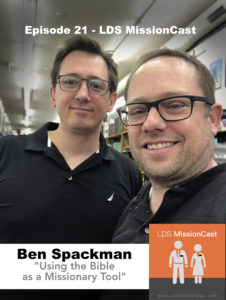Podcast: Download (65.5MB)
Subscribe: RSS

What is Proof Texting?
LDS MissionCast is an independently produced podcast shared by FairMormon. The Host and Presenters speak independently of The Church of Jesus Christ of Latter-day Saints, and FairMormon. LDS MissionCast a podcast to educate and inspire in the great cause of Missionary Work. This episode is hosted by Nick Galieti.
Ben Spackman is an interesting type of scholar. He spent some time teaching at BYU, but has since continued his formal education towards his PH.d. His educational background is so varied that I am not sure there is anyone who has repeated his same course of study. As a result I find his insights to be good food for thought. His area of expertise deals a lot with ancient scripture. Sometimes we don’t spend much time as missionaries considering the role of ancient scripture in our lives, but we don’t always know what the Bible means or how the Bible is used in other faith traditions. I am sure we can all admit that there are good and bad ways to use the Bible in missionary work. Ben Spackman helps us to not only help us learn how to use the Bible better in our own lives, but how to understand its use by other religions, so that we might be able to better build bridges of understanding between different faiths.
When we use scriptures to teach the gospel, we sometimes get confused when others don’t see the Bible the same way that we do as Latter-day Saints. Missionaries tend to follow the practice of proof texting (or prooftexting) which does very little to help teach people the true gospel of Jesus Christ. So, again, Brother Spackman is here to help us know how to better use the Bible as a teaching tool in missionary work.
Links and content mentioned in this episode:
Benjamin the Scribe (Ben Spackman’s Patheos Blog)
Ben Spackman on LDS Perspectives Podcast – Genre in the Bible
Ben Spackman on LDS Perspectives Podcast – Genesis Chapter 1
Why Bible Translations Differ – BYU’s Religious Educator publication
Article by Grant Hardy on The King James Bible and the Future of Missionary Work – Dialogue Journal

The heading on this page is “What is prooftexting?” – and the answer below does everything except answer the actual question
The text of this post is to describe the podcast, the audio program attached to the link. The answer is in the audio material of the podcast.
So if the story of Jonah is only poetic, why does Jesus talk about it as if it’s a fact? “For as Jonah was three days and three nights in the belly of a huge fish, so the Son of Man will be three days and three nights in the heart of the earth.” (Matt 12:40). If you read the Bible from cover to cover a few times you may find it does not contradict. I like your advice to read the whole Bible and not just memorize certain verses (2 Tim 3:16).
I appreciate you listening to the podcast. I would recommend Ben Spackman’s interview on LDS Perspectives (click here to listen) as he addresses the various arguments on this matter.
But, to address your comment more directly, you assume Jesus talked about it as if the story told in the book of Jonah was historical fact. There is little dispute that there was a real prophet named Jonah. What does seem to be in question is the historicity of the event written in the book of Jonah. Just because Jesus referred to something doesn’t mean it was historical fact. Jesus spoke in parables, he used symbolism, and it is not out of line for him to make reference to something that is culturally known to the people, regardless of its historicity, as means of teaching a principle. Its why he spoke of sheep and lambs, fish and fishing. People are not literally fish, lambs, goats, or anything to which Jesus made comparison, just as his referencing Jonah doesn’t magically make the story in the book of Jonah a real story of historical fact.
In General Conference, Prophets have alluded to works of fiction as a way to teach a point, or to illustrate a principle. When President Monson spoke of the book, “The Mansion” by Henry Van Dyke, he wasn’t declaring that the main characters in the book were now all of a sudden real, or that by their mere mention they became historical fact, and that if they weren’t real the message of the story would have no meaning.
The scriptures refer to the “Sign of Jonah” because it was a sign, a type. That sits well with me.
On Jesus and Jonah, see here. http://www.patheos.com/blogs/oneeternalround/2010/09/jonah-the-insufficiency-of-the-new-testament-argument/